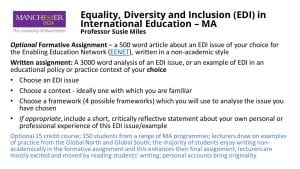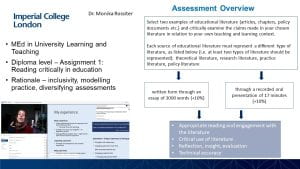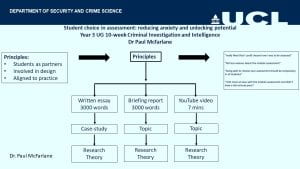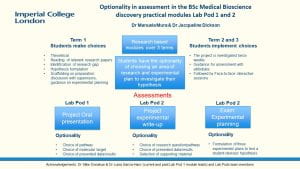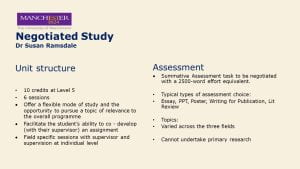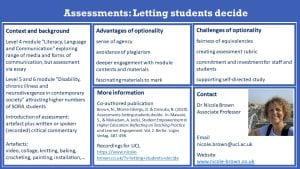UCL has been working with University of Manchester, University of York, and Imperial College on a QAA-funded project exploring the potential for assessment optionality. Today the project team facilitated a one-day online event entitled “Optionality in Assessment: What works and what are the barriers?” to share findings and celebrate the release of the main project report and recommendations. The project has aimed to answer several fundamental questions on optionality:
- What are academic and student opinions on the feasibility, practicality, and utility of assessment optionality?
- What is the current practice and opinion on the use of Assessment Optionality across the four institutions?
- How can we better empower and enable colleagues to design and utilise effective and appropriate options in Assessment?
The event, seamlessly chaired by Miriam Firth from the University of Manchester, was designed to bring together students, academics, and professional services staff to discuss and explore the concept of assessment optionality. An impressive 100 attendees participated in the session, highlighting the genuine interest and potential impact of the project.
The main project findings are now available from the QAA website. You can access the report directly.
Project Findings
The project has comprised of a literature review, staff (702 responses) and student (522 responses) surveys, 8 focus groups and 11 interviews. The first report provides a brief literature review, findings from the project with views from staff and students and recommendations for the sector. The recommendations suggest involving students in assessment design, introducing diverse formats for inclusivity, providing guidance for self-regulation, ensuring transparency and consistency in grading, and balancing student choice to prevent easy assessments. Adequate training and support for staff and students are essential, along with technology adoption. Streamlining administrative processes can alleviate workload concerns, and compassionate approaches should accompany assessment options. The second report, to be published later this year, will provide practical guidance on how to incorporate optionality into assessments.
Case Studies
Real-world examples of how assessment optionality is being implemented were shared from across the four institutions.
- Dr Nicole Brown, UCL [See a previous case study post on Nicole’s module]
- Dr Elizabeth Hauke, Imperial College London
- Dr Susan Ramsdale, University of Manchester
- Dr Manuela Mura & Dr Jacqueline Dickson, Imperial College London
- Dr Paul McFarlane, UCL
- Dr Monika Rossiter, Imperial College London
- Professor Susie Miles, University of Manchester
Discussion sessions
During the event there were two discussion sessions. The first focused on initial thoughts and questions in response to the case studies.
The second had the attendees consider the areas of practice, policy, guidance and ideas for the future and input in to a Padlet, which will be shared on the QAA website.
- Practice. What case study examples of student choice in assessment are you aware of? Do you offer students choice in assessment? Have you had choices in your assessment.
- Institutional Policy. What policy/ies support student choice in assessment at your University?
- Institutional guidance. What guidance documents do you use in your institution for student choice in assessment?
- Ideas for the future. What should the sector consider in regard to student choices in assessment?
- Other areas/notes.
Jesper Hansen from UCL presented back on the rich discussion that covered a variety of areas including the challenges of PSRBs, incentives for students and staff to take up optionality, admin and skills support for staff and students utilising optionality, diversity of assessments across programmes and the need for collaboration in the sector.
Project Team
The Project lead is Miriam Firth (UoM) supported by project administrators Lindsay Dunn, Sam Ward and Ben Murray (UoM), and project managers Lara Melville, Fran Edwards and Hannah Brown (UoM). Our main QAA liaison is Ann Cotterill.
| UoM (Gabrielle Finn) | York (Jill Webb) | Imperial (Martyn Kingsbury) | UCL (Jesper Hansen) |
|
|
|
|
| Project Assessment in HE consultant : Simon Walker | |||
| Project data analysts : Margarita Panayiotou, Ono Ojobo, and Tom Burgess (all in UoM) | |||
References
Firth, M., Ball-Smith, J., Burgess, T., Chaffer, C., Finn, G., Guy, M., Hansen, J., Havemann, L., Glover, N., Kingsbury, M., Pazio, M., Penn, J., Trzeciak, F., Shackleford-Cesare, K., Walker, S., Webb, J., (2023) Optionality in Assessment: A cross institutional exploration of the feasibility, practicality & utility of student choices in assessment in UK higher education, 26 pages, published by the Quality Assurance Agency in October 2023

